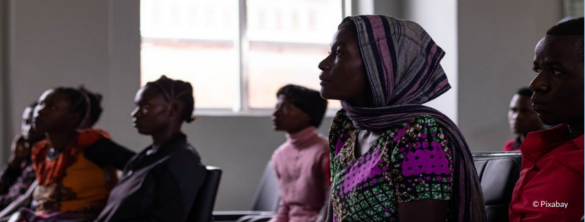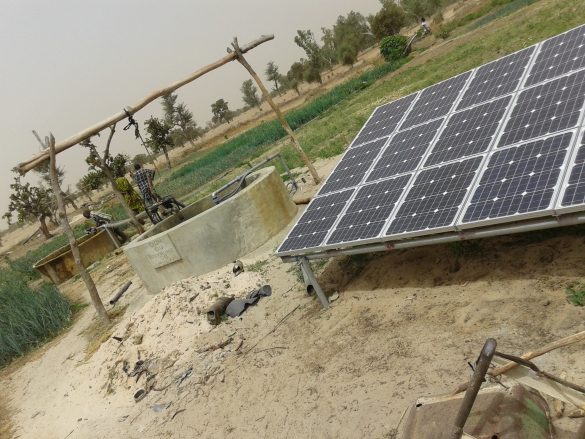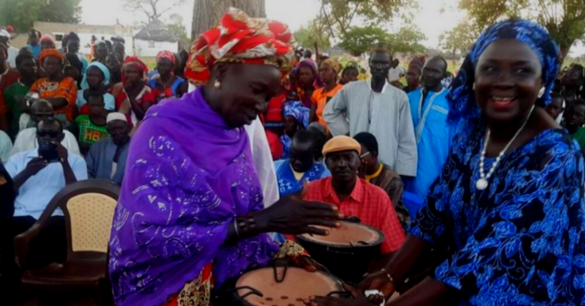Using solar energy to ensure organic agriculture practices adapted to climate change
The Department of Gossas is located within the Fatick region on the West Coast of the country, with most of the surface area being shrub steppe and the main economic activities in agriculture and livestock. The Departmental Council is the local authority, whose mission is the design, programming and implementation of economic, social and environmental development actions of local interest. By Law 2013-10, the State of Senegal transferred nine areas of competence to the country, including the environment, natural resource management and the fight against climate change.
Climate change, especially an increased frequency in droughts, but also floods, heat waves and violent winds, pose a significant threat to the territory. The impacts derived from climate change are food insecurity, water scarcity, declining agricultural productivity, loss of biodiversity, declining human and animal health, land degradation and increased deforestation. In this regard, climate change hinders sustainable development of the territory and hinders poverty reduction efforts.
Following the implementation of the Integrated Territorial Climate Plan of Fatick (region) in 2014, it seemed essential to move on to the stage of carrying out the actions mentioned in the project sheets on adaptation and mitigation of climate change. Given that agriculture constitutes the main sector in Gossas, which is highly affected by the impacts of climate change, adapting agricultural practices to a changing climate is of utmost importance.
The territory of the department is covered by numerous valleys that can be flooded in winter and which occupy about 120,000 ha. These so-called “dead valleys” thus represent potentialities whose exploitation for agro-pastoral purposes could substantially increase production and producers’ incomes. Another alternative to increase the population’s income is the rational exploitation of groundwater at valley level, as water is the key element for increasing and securing agricultural production and reducing poverty among people in rural areas. So far, water control policies have focused on large irrigated areas, but it is now recognised that it is no longer sufficient to consider only those large areas that are managed by central organisations. Moreover, more attention and investment are needed in all other systems that provide access to water resources, such as small-scale irrigation through an innovative drainage system, including the use of solar energy for productive water management.
Therefore, a pilot project of a solar photovoltaic mine drainage system was developed at the Loumbel Kelly farm in Gossas to assess the use of solar energy to provide a drainage system on other farms. In the area, the groundwater table is on a downward trend due to reduced rainfall and it should be noted that this groundwater table is superficial and is located at only 7m at the lowlands, while it is at 15 to 20m at the level of the continental shelf. So, to develop the market gardening activity, it is important to have an efficient drainage system because the manual system does not allow for large agricultural production.
In order for the project to be successful, a number of preconditions existed:
- A strong motivation of the population because the market gardening plots with the solar drainage system are an innovation and enhance the work of the beneficiaries;
- The organisation of beneficiaries who have opted for organic farming by banning the use of pesticides and chemical fertilisers;
- Families who have land that they can use to improve their incomes on the basis of a decision by the town hall;
- The control of productive water with the commissioning of solar-powered pumps; and
- The supervision of beneficiaries by the technical services, in particular the Departmental Service for Rural Development.
However, some risk factors were also identified:
- High costs of solar equipment and the difficulty of ensuring the maintenance and availability of spare parts; hence the need to involve other development partners;
- Some beneficiaries are tempted to use chemical fertilizers to increase their production;
- In the event of poor wintering, the water tables would not be sufficiently charged, which would make it difficult to supply water for market gardening.
Results:
To date, the Gossas Departmental Council has allowed the construction of 20 wells, and the acquisition and installation of 2 solar electric pumps. With the solar photovoltaic mine drainage system, manual drainage has disappeared from the site and the basins only take 1h to 1h30 of pumping to fill. The solar photovoltaic drainage system has had the following induced effects:
- The market area is occupied and developed by farmers, especially women;
- The production of aubergines, onions and tomatoes has increased compared to the situation before solar-powered pumps;
- The project also helped to promote organic farming, raise farmers’ awareness of environmental protection and promote renewable energy;
- It also raised farmers’ awareness of the need to save water by technical means but also to avoid the degradation of the groundwater quality (drip irrigation).




